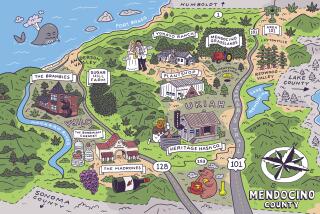Florida area plants seeds of agri-tourism
- Share via
Miami — Glenn and Christina Whitney are trying to decide how to expand their five-acre Redland, Fla., farm and produce market into a tourist destination.
Should they set up a microbrewery? Open a bed-and-breakfast? Increase their stock of you-pick fruits and vegetables in small hydroponic planters?
“We don’t close during off-season, so we could do a lot more here,” Glenn Whitney said.
With Miami-Dade County pushing to grow agri-tourism, the couple could do any of those things.
Concerned about the mounting pressure on growers over the last decade to sell their land for urban uses, county officials want those with small farms to attract visitors by emulating the tourism cachet of California’s Napa Valley and New York’s Finger Lakes region.
“If the owners can make money and create jobs, they’ll be more prone to keep their land in agriculture,” said Miami-Dade County Commission Chairman Dennis Moss, whose district includes part of Redland.
Moss and eight other commissioners sponsored a trio of recently approved ordinances that loosen restrictions on small-scale commercial ventures within the farms. The measures allow small wineries, breweries and distilleries that make drinks from produce grown on-site as well as bed-and-breakfast inns with up to six guest rooms.
According to a memo from County Manager George Burgess, about 2 million visitors pass through the area every year en route to the Keys or Everglades and Biscayne national parks.
A patchwork of wineries, markets selling jams and chutneys made on-site and cozy lodgings could draw some of those visitors on to country roads, said Robert Burr, founder of the Redland Riot Road Rallye tour.
“Old-timey stuff has a chance to come back and thrive,” he said. “If it could be sustained by having family-friendly countryside things, it would be wonderful.”
Not everyone is thrilled with the county’s campaign.
Ron Weeks, a resident of an agriculture-zoned area, said he’s concerned that people will try to do more with their farms than what’s allowed.
“We’ve had fruit stands up here that turned into cantinas,” Weeks said. “In the bed-and-breakfasts, how do you enforce how long someone stays? How do you keep it from becoming a boarding house?”
Small farmers are gearing up to take advantage of the new economic opportunities.
Gabriele Marewski, owner of southern Miami-Dade’s Paradise Farms, has become well-known among local organic foodies for her Dinner in Paradise events, which feature lavish meals cooked on the farm by some of the county’s top chefs.
Now, the bed-and-breakfast she’s dreamed of opening in her home is a real possibility.
“I have a whole suite in my house for it,” said Marewski, who also wants to expand her production of dried tropical fruits such as carambola, mango, litchi and sapodilla.
“The more we can diversify our farms, the more secure we are,” she said.
A few miles to the north at Bee Heaven Farm, Margie Pikarsky is looking forward to making more out of the heirloom tomatoes, beans, carrots, avocados, beets and Asian greens she grows on her five acres.
“I’d like to do preserves and pickling, some drying, maybe make ice cream,” said Pikarsky, who bought the land in 1995 and had her farm certified organic two years later.
“Now comes the big job: finding out what’s possible, getting all the licensing. All that has to be worked out now,” she said.
Though the county has allowed small wineries since 2004, any other ancillary use, except serving appetizers and selling fresh produce, was off limits until this month.
Peter Schnebly, owner of the area’s sole winery, Schnebly Redland’s, said he plans to turn fruit too ripe or blemished for selling fresh into beer, vodka and brandy.
His tastings of wines made from unusual sources such as guava, passion fruit and avocado have become popular among folks who visit the southwestern farming communities.
Now that he has more freedom to boost profits from his land, Schnebly said he’d like to open a restaurant and expand his selection of crops.
“Of course, just because I get to do all these things doesn’t necessarily mean that I’m going to be successful,” Schnebly said. “But it does untie my hands.”
Morales writes for the Miami Herald / McClatchy.
More to Read
Sign up for The Wild
We’ll help you find the best places to hike, bike and run, as well as the perfect silent spots for meditation and yoga.
You may occasionally receive promotional content from the Los Angeles Times.






